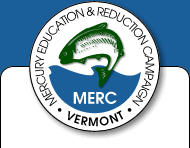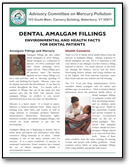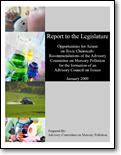 |
 |
Vermont Advisory Committee on Mercury Pollution
Vermont's Advisory Committee on Mercury Pollution (ACMP) was formed
to advise the general assembly, the executive branch, and the general
public on matters relating to the prevention and cleanup of mercury
pollution, and the latest science on remediation of mercury pollution.
The statute
establishes the committee and requires that it consist of:
- one member of the house of representatives, appointed by the
speaker;
- one member of the senate, appointed by the committee on committees;
- the secretary of natural resources, or the secretary's designee;
- one representative of an industry that manufactures consumer
products that contain mercury;
- one public health specialist;
- one representative of the Abenaki Self-Help Assn., Inc.;
- one toxicologist;
- one scientist who is knowledgeable on matters relating to mercury
contamination;
- one representative of a municipal solid waste district;
- the commissioner of fish and wildlife, or the committioner's
designee; and
- one hospital respresentative.
Committee Members
The current members of the Advisory Committee on Mercury Pollution
are:
Representative Cynthia Martin - House
Committee on Fish, Wildlife, and Water Resources.
Senator Richard McCormack - Senate
Natural Resources and Energy Committee.
Gary Gulka - Vermont Agency of
Natural Resources, Environmental Assistance Office.
Ruma
Kohli - IBM Burlington, Chemical Management Program Manager.
Mary Jean Rajda - RN MAEd Infection
Control Nurse, Porter Hospital, Inc
Michael Bender
- Abenaki Self-Help Association, Inc. Executive Director Mercury
Policy Project.
Bill Bress,
PhD. - State Toxicologist and Chief of the Environmental Health
Division, Vermont Department of Health.
Neil Kamman
- Vermont Agency of Natural Resources, Environmental Scientist.
Jen
Holliday - Environmental & Safety Compolaince Manager,
Chittenden Solid Waste District
Eric
Palmer - Vermont Agency of Natural Resources, Department
of Fish and Wildlife
John Berino
- Representative for the Vermont Asociation of Hospitals and Healthcare
Systems
Committee Purpose and Charge
The 1998 mercury legislation created an eight-member advisory committee
on mercury pollution to advise the general assembly, the executive
branch, and the general public on matters relating to the prevention
and cleanup of mercury pollution and the latest science on remediation
of mercury pollution. Legislation passed in 2005 added three members
to the committee and termination of the committee as of January
1, 2010 unless extended by the general assembly.
By January 15th of each year, the advisory committee
will report to the general assembly regarding:
- The extent of mercury contamination in the soil, waters and
air of Vermont.
- The extent of any health risk from mercury contamination in
Vermont, especially to pregnant women, children, the Abenaki Self-Help
Association, Inc. and other communities that use fish as a major
source of food.
- Methods available for minimizing risk of further contamination
or increased health risk to the Vermont public.
- Potential costs of minimizing further risk and recommendations
of how to raise the funds necessay to reduce contamination and
minimize risk of mercury-related health problems in Vermont.
- The effectiveness of the established programs, including manufacturer-based
reverse distribution systems for in-state collection, subsequent
transportation and subsequent recycling of mercury from waste
mercury-added products and recommendations for altering the programs
to make them more effective.
- Coordination needed with other states to effectively address
mercury issues.
- Ways to reduce the extent to which solid waste produced within
the state is incinerated at incinerators, regardless of location,
that fail to use the best available technology in scrubbing and
filtering emissions from the incinerator stack.
|
 |
 |



